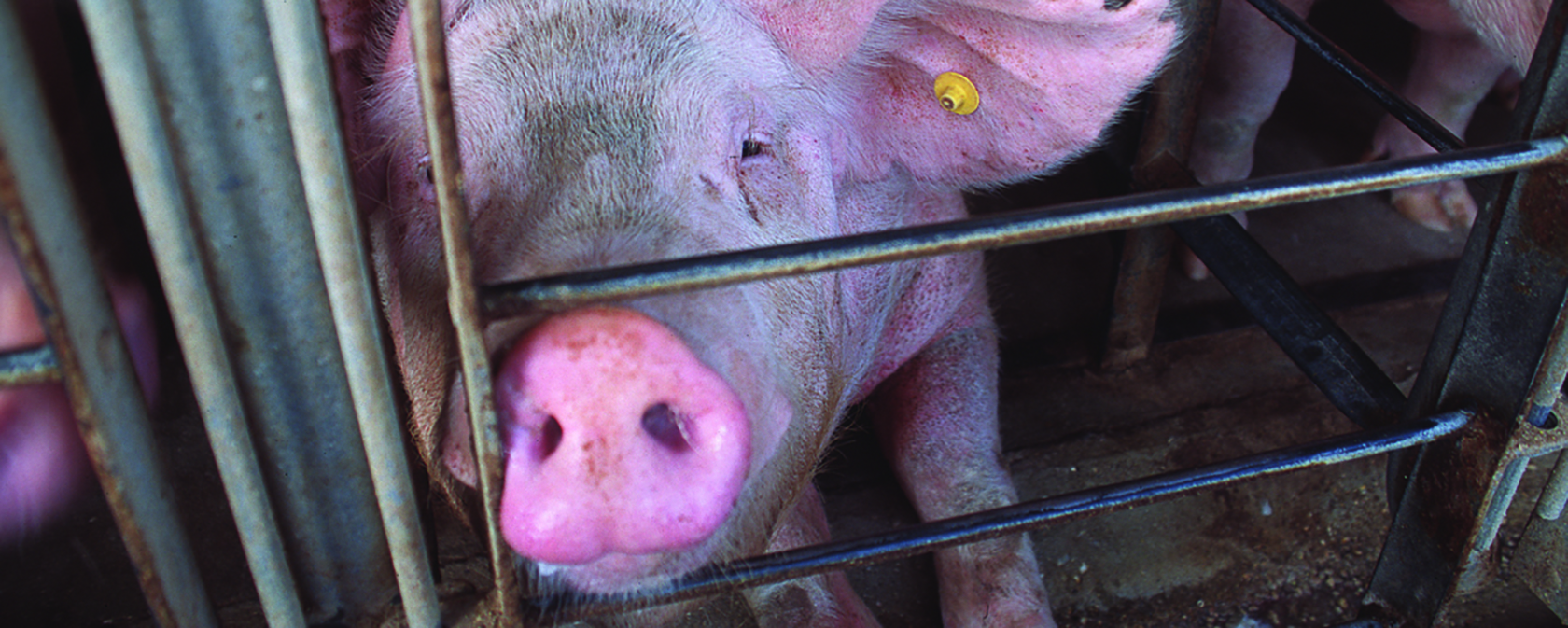[ad_1]
By Sara Amundson and Kitty Block
Today, we filed a complaint with the U.S. Securities and Exchange Commission against the largest meat and poultry company in the world, JBS and its subsidiary, Pilgrim’s Pride. Together with the Center for Biological Diversity, and in partnership with the Farmed Animal Advocacy Clinic at Vermont Law and Graduate School, we allege that these companies are misleading investors about how they treat animals and about their climate and environmental impacts.
At a massive scale, JBS sells beef, pork and poultry products that mostly come from animals who suffer some of the cruelest factory farming conditions. Last year, JBS announced that it would seek to become listed on the New York Stock Exchange—a move that would allow it to raise even more capital from U.S. investors, and in turn expand its cruel and unsustainable factory farming practices. As part of its initial public offering (IPO), a step in the process to become a U.S.-listed public company, JBS must disclose information to investors about its business, and the SEC has to ensure JBS’s filings do not mislead investors.
Our complaint alleges that JBS and Pilgrim’s Pride appear to repeatedly mislead investors by making false and misleading animal welfare and climate claims in their sustainability reports and on websites, and that they have not disclosed necessary information in their SEC filings. JBS is well aware that investors care deeply about these issues and tries to portray itself as a responsible company. But, as alleged in the complaint, nothing could be further from the truth.
On animal welfare, JBS and Pilgrim’s frequently claim that animals in their supply chain are treated humanely. But these companies source animals from their own and others’ factory farms that mostly keep animals in extreme confinement and other cruel conditions. In addition, both companies have a litany of documented violations of slaughter-related federal laws—falling short of even the bare minimum humane treatment requirements these laws impose. A recent undercover investigation by Mercy For Animals at Pilgrim’s facilities found vicious cruelty to birds, such as workers throwing and kicking the animals. In 2018, we asked the Federal Trade Commission to investigate Pilgrim’s Pride for misleading claims in its marketing and advertising about its chickens, and the company subsequently altered some of those claims.
We believe the companies should be honest with investors and consumers, who have increasingly rejected cruelly produced meat at the ballot box and in their grocery stores.
We also allege that JBS and Pilgrim have misled investors about sustainability. As described in our recent Sustainability Scorecard, consumers are increasingly seeking out more sustainable food options, and they need true and accurate information to make informed choices. JBS’s much-touted claim that its operations would reach “net zero” emissions by 2040 has already been rejected by the Better Business Bureau and is also being challenged in a recent lawsuit by the New York attorney general.
Between greenhouse gas emissions from animal digestion, bodily waste, and everything else needed to manufacture meat products (such as running large factory farms and transporting and cooling meat products), animal agriculture by its very nature has a large climate impact. As The New York Times has put it, “one study found that JBS produces more emissions each year than all of Italy.” The complaint also alleges that JBS is misleading investors by failing to disclose important information related to its ability to comply with recent EU legislation prohibiting the sale of products that are the result of deforestation—including meat products.
We are far from alone in our concerns about these companies. Earlier this year, a bipartisan group of 15 U.S. senators wrote to the commission to express concern about the public offering, noting that JBS has been involved in extensive bribery schemes, and that the company has a “long history of misleading investors in its corporate filings by exaggerating environmental stewardship and downplaying other risks.” The letter notes that “JBS is linked to more destruction of forests and other ecosystems than any other company in Brazil…. At least six major supermarket chains have announced that they would no longer purchase JBS meat from Brazil because of its links to deforestation and others have curtailed purchases.”
Our concern with JBS misleading investors about how they treat animals and about their climate and environmental impacts dovetails with a fierce battle we are currently waging against congressional attempts to undermine Proposition 12, considered the nation’s strongest law on farm animal welfare, and similar measures in other states. Those attempts by lawmakers are simply “handouts” to large conglomerates pitted against American producers who have stated that they are willing and able to meet Proposition 12’s standards.
We implore the SEC to take our (and many others’) concerns over animal welfare, climate and the environment seriously, not just because it is the right thing to do, but because investors depend on the SEC to protect them from companies that deceive investors about these important topics in ways that can lead to serious losses. The SEC must investigate JBS and closely scrutinize its claims, and it should prevent the company from going public unless it is fully transparent and honest about its cruelty to animals and its true environmental impacts.
Kitty Block is CEO of the Humane Society of the United States.
[ad_2]
